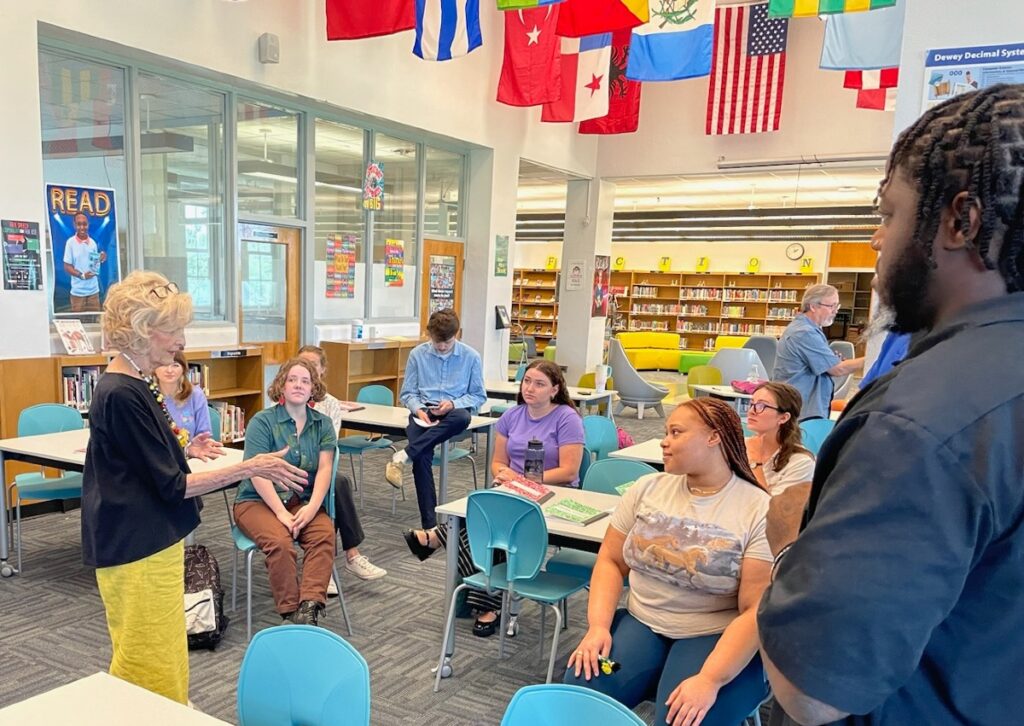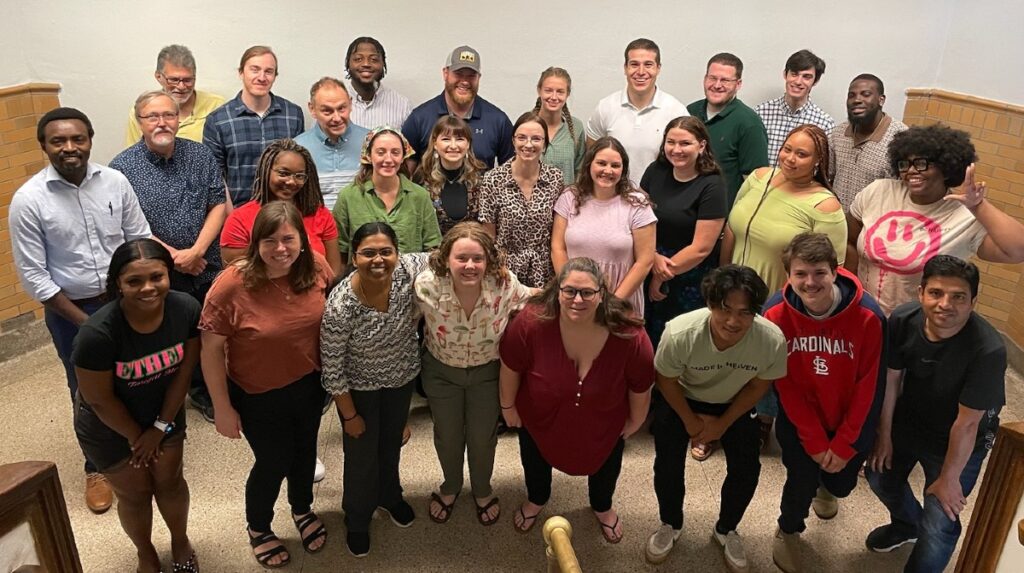Teach Kentucky is working to solve the teacher shortage and brain drain in Louisville
Teaching is a hard job. The pay is terrible, the students are difficult and the demands on educators are relentless. But those who feel called to teach find it to be a very rewarding career with the chance to make a real difference in the world. By helping children learn, teachers are setting students up for future success and creating an educated workforce for their communities.
Here in Louisville, Ky., the national teacher shortage is playing out in the schools. It’s believed that Kentucky is down about 1,700 teachers (as of February 2023). A quick glance at Jefferson County Public Schools’ hiring portal in June shows 252 vacancies for teachers from early childhood through high school. According to federal data reported by NPR, qualified special education, science and math teachers are among the hardest to find.
In February, Kentucky Department of Education Commissioner Jason Glass said, “While we’ve always been seeing shortages in those areas of math, science, special education and highly specialized teaching roles, we’re now seeing shortages in areas such as elementary education and social studies, which historically, have had an abundance of applicants,” Spectrum News reported. Glass cited overall teacher compensation, job demands and the politicization of education as reasons for the shortage.
Teach Kentucky is making change
One program is working to fix this issue. Teach Kentucky is a nonprofit organization founded by Louisvillian Rowan Claypool, who is working to solve the problem by bringing smart college grads to the city and helping them create successful careers in education.
The program recruits potential teachers from all over the country. The applicants are mostly people with a bachelor’s degree who want to become teachers but who don’t have teaching experience or certification. They get full-time teacher placement in JCPS schools, they get summer instruction before school starts, a mostly paid-for master’s degree and support, while they live here and teach.
Claypool started with Bulldogs in the Bluegrass, a program that brings Yale students to Louisville to work during their summer break to try to combat the “brain drain” that Louisville and other Fast Future cities are experiencing. That program has run for 21 summers and brought 650 Yale students to the city. He expanded the program to include nine cities, like Cleveland, Minneapolis and St. Louis, and called it Bulldogs Across America.
“I just knew that kids needed to know their own country,” Claypool said. “And they’re in the heartland of that country. You had these great cities that needed really, really strong leaders, and that schools like Yale, and many others, were stripping the topsoil and not replenishing it in any way.”
But the real issue with bringing young people to cities is making sure they have employment when they graduate. “That’s the whole thing. It’s not climate, it’s not parks, it’s not festivals, it’s not any of that,” Claypool said. “It is solely about my individual economic opportunity. Start, you know, to start a career. And the problem is, you know, you’re gonna have a lot more opportunities in Chicago and New York and Atlanta and Nashville. So you go there, and then you meet a guy or you meet a girl or whatever, and you get locked in and you never come home.”
Teaching the teachers
He realized that a strong opportunity area in Louisville was teaching in public schools. He looked into Teach for America, which had students competing for placement, but he found that Kentucky wasn’t that interested in the program because it didn’t produce teachers who were interested in staying in the profession for the long haul. So, he created Teach Kentucky.

This year’s Teach Kentucky cohort learning from Dr. Pat Todd, executive director of Jefferson County Public Schools, as part of their summer institute training. They are in the Olmstead North Middle School library. | Image courtesy of Teach Kentucky
Teachers in the program have graduated from college, some already have master’s degrees in other subjects, and they are ready to work. But they don’t have the certification or really any real knowledge about teaching. “At the end of two years, you’ve got two years of frontline teaching experience, you’ve learned how to be an early stage educator, you’ve gotten a master’s degree, and you’re certified in the state. And now, if we can get you to stick, you really are an asset to the community, you’re not a sort of educational tourist.”
Each year, a cohort of participants arrives in the city at the beginning of the summer to prepare for their first year of teaching in the fall. They get a full-time position as a teacher in JCPS, while they attend graduate school on nights and weekends at University of Louisville, Spalding University or Asbury University (online, for those interested in teaching English as a Second Language). Through AmeriCorps, which partners with Teach Kentucky, they get two grants of $6,400, paying $13,000 of the $17,000 cost, helping them graduate with little to no student loans for their master’s degree.
The teachers are staying here. In the last five years of the program, 64% are still teaching in Kentucky, and 10% are teaching somewhere else, Claypool said. That makes 75% of Teach Kentucky teachers still educators.
That’s way above the norm. Researchers estimate that more than 1 million teachers move in and out of schools annually, and between 40 and 50 percent quit within five years, according to the Hechinger Report.
Mentorship and benefits work
Teach Kentucky also brings in Retired Teacher Advocates. Retired teachers mentor the new teachers in the program, giving them moral support and helping them learn the profession.
“They’re just there to amplify what’s working,” he said. “Other people are assessing them, judging, you know, evaluating. We’re just there to find the good stuff, and then be a shoulder to cry on. Powerful relationships form from that.”
This year’s cohort has 29 people from all over the country, and some from outside the U.S. Since the COVID-19 pandemic, it’s become more difficult to entice people to move, and the program has begun to look locally. There are some new teachers who have already been working in the schools as substitutes or tutors who want to take the next step to become teachers. Some are foreign-born adults who have been working in the Newcomer Academy, a school for kids new to the United States, but want to teach.
The organization gets a strong set of applicants for positions in the program, Claypool said. Last year there were 313 applicants. One of the ways he works to get people interested is that the team calls the applicant as soon as they’ve applied. “It shifts people’s view of us very quickly,” he said. “We went from them thinking, ‘Well, Kentucky kind of looks promising,’ to ‘Wow, they called me right up!’”
Try harder
Trying harder is the key to the success of the program, Claypool said. “We’re really trying to launch education careers, that’s the term we use. We’re not just recruiting people to just be substitutes. We’re trying to get really qualified people who want to launch an education career, and we invest a lot of resources and support in helping them realize that dream.”
The organization’s graduates include six principals, nine teachers who are nationally board certified, many department chairs and team leads, and many who are members of their local site-based councils. Claypool said participants are “healthily ambitious.”
And once they have spent a couple of years here, they’re more likely to stay. “If coming to Louisville makes good sense, then staying here makes good sense.”

